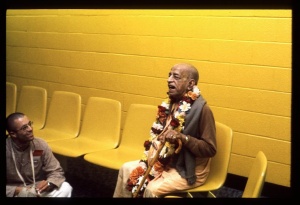CC Antya 4.179 (1975): Difference between revisions
(Vanibot #0027: CCMirror - Mirror CC's 1996 edition to form a basis for 1975) |
(Vanibot #0020: VersionCompareLinker - added a link to the Version Compare feature) |
||
| Line 2: | Line 2: | ||
<div style="float:left">'''[[Sri Caitanya-caritamrta (1975)|Śrī Caitanya-caritāmṛta (1975)]] - [[CC Antya (1975)|Antya-līlā]] - [[CC Antya 4 (1975)|Chapter 4: Sanātana Gosvāmī Visits the Lord at Jagannātha Purī]]'''</div> | <div style="float:left">'''[[Sri Caitanya-caritamrta (1975)|Śrī Caitanya-caritāmṛta (1975)]] - [[CC Antya (1975)|Antya-līlā]] - [[CC Antya 4 (1975)|Chapter 4: Sanātana Gosvāmī Visits the Lord at Jagannātha Purī]]'''</div> | ||
<div style="float:right">[[File:Go-previous.png|link=CC Antya 4.178 (1975)|Antya-līlā 4.178]] '''[[CC Antya 4.178 (1975)|Antya-līlā 4.178]] - [[CC Antya 4.180 (1975)|Antya-līlā 4.180]]''' [[File:Go-next.png|link=CC Antya 4.180 (1975)|Antya-līlā 4.180]]</div> | <div style="float:right">[[File:Go-previous.png|link=CC Antya 4.178 (1975)|Antya-līlā 4.178]] '''[[CC Antya 4.178 (1975)|Antya-līlā 4.178]] - [[CC Antya 4.180 (1975)|Antya-līlā 4.180]]''' [[File:Go-next.png|link=CC Antya 4.180 (1975)|Antya-līlā 4.180]]</div> | ||
{{CompareVersions|CC|Antya 4.179|CC 1975|CC 1996}} | |||
{{RandomImage}} | {{RandomImage}} | ||
==== TEXT 179 ==== | ==== TEXT 179 ==== | ||
<div class="verse"> | <div class="verse"> | ||
:āmi | :āmi ta'--sannyāsī, āmāra 'sama-dṛṣṭi' dharma | ||
:candana-paṅkete āmāra jñāna haya | :candana-paṅkete āmāra jñāna haya 'sama' | ||
</div> | </div> | ||
| Line 18: | Line 17: | ||
<div class="synonyms"> | <div class="synonyms"> | ||
āmi—I; | āmi—I; ta'-certainly; sannyāsī—in the renounced order of life; āmāra—My; sama-dṛṣṭi—seeing everything on the same platform; dharma—duty; candana-paṅkete—between sandalwood pulp and mud; āmāra—My; jñāna—knowledge; haya—is; sama—same. | ||
</div> | </div> | ||
| Line 25: | Line 24: | ||
<div class="translation"> | <div class="translation"> | ||
"Since I am in the renounced order, My duty is to make no distinctions but instead be equipoised. My knowledge must be equally disposed toward sandalwood pulp and dirty mud. | |||
</div> | </div> | ||
Latest revision as of 01:54, 27 January 2020

A.C. Bhaktivedanta Swami Prabhupada
TEXT 179
- āmi ta'--sannyāsī, āmāra 'sama-dṛṣṭi' dharma
- candana-paṅkete āmāra jñāna haya 'sama'
SYNONYMS
āmi—I; ta'-certainly; sannyāsī—in the renounced order of life; āmāra—My; sama-dṛṣṭi—seeing everything on the same platform; dharma—duty; candana-paṅkete—between sandalwood pulp and mud; āmāra—My; jñāna—knowledge; haya—is; sama—same.
TRANSLATION
"Since I am in the renounced order, My duty is to make no distinctions but instead be equipoised. My knowledge must be equally disposed toward sandalwood pulp and dirty mud.
PURPORT
It is the duty of a sannyāsī, a person in the renounced order, to be always equipoised, and that is also the duty of a learned man and a Vaiṣṇava. A Vaiṣṇava, a sannyāsī or a learned person has no conception of the material world; in other words, he has no conception of anything materially important. He has no desire to use sandalwood pulp for sense gratification, nor does sense gratification make him hate mud. Acceptance or rejection of material things is not the concern of a sannyāsī, a Vaiṣṇava or a learned person. An advanced devotee has no desire to enjoy or reject anything. His only duty is to accept whatever is favorable for the advancement of Kṛṣṇa consciousness. A Vaiṣṇava should be indifferent to material enjoyment and renunciation and should always hanker for the spiritual life of rendering service to the Lord.